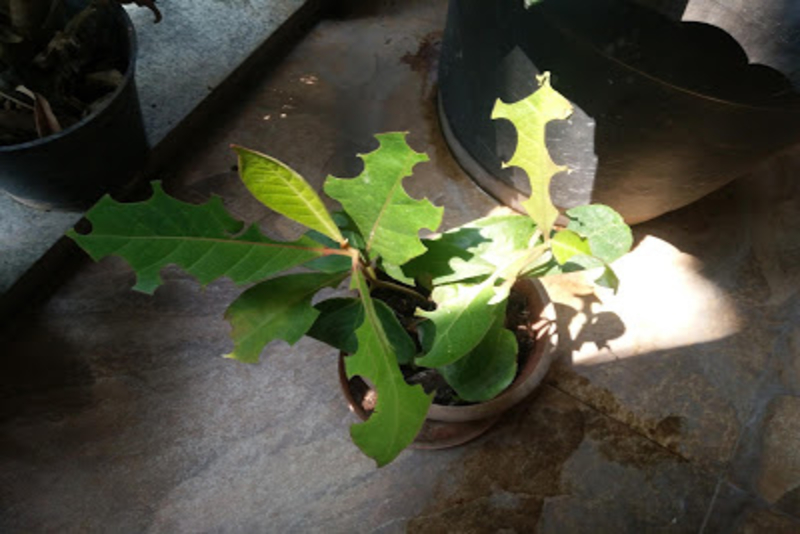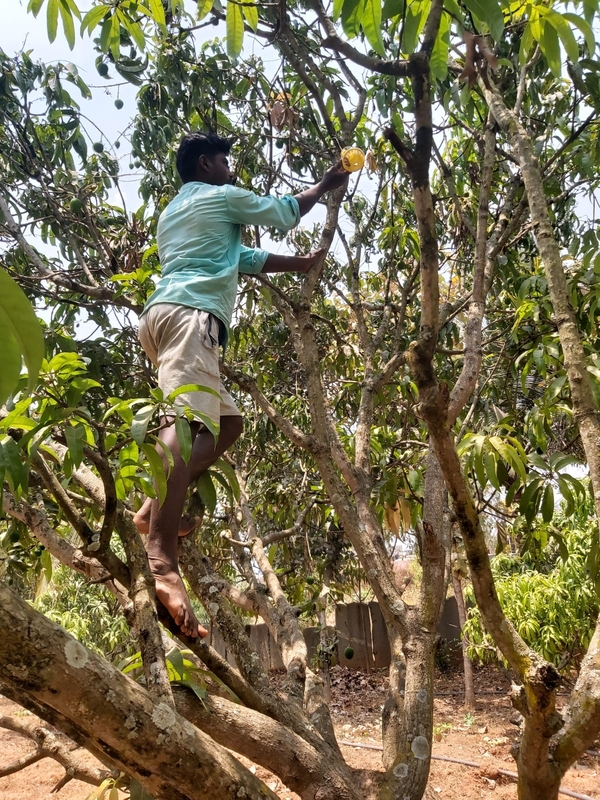Leaf cutter ants decimate plants, Bangalore, India

Two little plants just decided to grow in a pot and probably have germinated from seeds from the compost.I left them there to grow bigger, to see what they grew into. In a few weeks they had grown to about six inches with nice broad leaves and I still had no idea what plants they were. They were not the usual watermelon or the pumpkin vines which always sprout from the compost. Or the pomegranate or papaya which can be utter pests. These two were definitely different. And they were growing well which was lovely.
Then one day I noticed some neat semi-circles of their leaves had been cut out. I did not really pay too much attention till I looked again today and every leaf has semi-circles chopped out of every single leaf. That reminded me of the rose bushes we had as children in Green Park, New Delhi, where I had noticed the same thing happening.And then again, many years later in Bangalore in our home in Castle Street. Our rose bushes had mostly the young and fresh leaves cut neatly out by something or someone.
Nature has these strange insects I know, which are leaf cutters, but I did not pay too much attention then. Now during the lockdown, I have the time and decided to do some research online to find out who was denuding my plants so neatly without a trace. Guess ‘cause I am watching ‘Mentalist’ at the moment on Amazon Prime and that has put me into an investigative mode.
Reading a fascinating paper named - “The True Origin of Agriculture: Credit Goes to the Ants” by Professor Raghavendra Gadagkar from the IISc I got the most astounding and interesting insights into why both ant leaf cutters and bee leaf cutters operate.
“ Our achievements are surely humbled by the lowly ants which appear to have invented agriculture, and a fairly sophisticated type of agriculture - almost 50 million years before we did,” says Prof Gadagkar.
He explains that the fungus growing ants in the new world, and termites in the old world, are ecologically very dominant. With a few exceptions, all fungus growing ants are also leafcutters - they cut pieces of leaves, bring them to the nest and use them as the base on which to grow fungi. The ants derive their nutrition only from the fungi so grown and not from the leaves themselves.
There are some 200 species of ants which feed themselves by fungus farming. Because of their ecological dominance and their insatiable hunger for leaves, leafcutter ants are major pests in the agricultural world.
These ants can devastate forests and agriculture alike and they may maintain ten or more colonies per hectare and a million or more individuals per colony. Where they occur, the leafcutter ants consume more vegetation than any other group of animals.
Ants can be considered pests in our homes --those mobile dots that can suddenly appear in sugar bowls, crawl in neat lines over shoes or ruin an otherwise perfect picnic are a silent, if annoying pointer to one of the most successful forms of life on Earth.
Edward O. Wilson, sociobiologist at Harvard University and the world's leading authority on social insects, has studied ants for more than 50 years and says he finds it difficult to overestimate the importance of them to life on Earth. "They are the main turners of the soil - more important than earthworms - the main predators of small insects and the principal scavengers and garbage collectors," he says. "They capture insects and help keep things in balance and they are also the principal movers of small animals such as fallen sparrows and small rodents."
In the field, leaves are cut to a size that is most convenient for an ant to carry back. In the nest the leaf fragments are further cut into pieces 1-2 mm in diameter. Then the ants apply some oral secretions to the leaves and inoculate the fragments by plucking tufts of fungi from their garden.
Interestingly, like I make my yogurt at home, the ants maintain a pure culture of the fungus of their choice and prevent bacteria and other fungi from contaminating their pure cultures. I scoop out a large tablespoon of the yogurt to save to make my next batch of curd, with fresh milk. Growing pure cultures of some of these fungi in the laboratory has proved difficult or impossible, says Wilson. How the ants achieve this remarkable feat remains poorly understood.
Not surprisingly, they manure their fungus gardens with pellets of their own faeces. When a colony is to be founded, the new queen receives a dowry from her mother's nest - a tuft of mycelia carried in her mandibles.
Fascinating to read and I would not have bothered to learn more if it was not for the lockdown or lock up as my colleague calls it. Will definitely make an interesting paper for the kids in class to write once I am back in college!
Then one day I noticed some neat semi-circles of their leaves had been cut out. I did not really pay too much attention till I looked again today and every leaf has semi-circles chopped out of every single leaf. That reminded me of the rose bushes we had as children in Green Park, New Delhi, where I had noticed the same thing happening.And then again, many years later in Bangalore in our home in Castle Street. Our rose bushes had mostly the young and fresh leaves cut neatly out by something or someone.
Nature has these strange insects I know, which are leaf cutters, but I did not pay too much attention then. Now during the lockdown, I have the time and decided to do some research online to find out who was denuding my plants so neatly without a trace. Guess ‘cause I am watching ‘Mentalist’ at the moment on Amazon Prime and that has put me into an investigative mode.
Reading a fascinating paper named - “The True Origin of Agriculture: Credit Goes to the Ants” by Professor Raghavendra Gadagkar from the IISc I got the most astounding and interesting insights into why both ant leaf cutters and bee leaf cutters operate.
“ Our achievements are surely humbled by the lowly ants which appear to have invented agriculture, and a fairly sophisticated type of agriculture - almost 50 million years before we did,” says Prof Gadagkar.
He explains that the fungus growing ants in the new world, and termites in the old world, are ecologically very dominant. With a few exceptions, all fungus growing ants are also leafcutters - they cut pieces of leaves, bring them to the nest and use them as the base on which to grow fungi. The ants derive their nutrition only from the fungi so grown and not from the leaves themselves.
There are some 200 species of ants which feed themselves by fungus farming. Because of their ecological dominance and their insatiable hunger for leaves, leafcutter ants are major pests in the agricultural world.
These ants can devastate forests and agriculture alike and they may maintain ten or more colonies per hectare and a million or more individuals per colony. Where they occur, the leafcutter ants consume more vegetation than any other group of animals.
Ants can be considered pests in our homes --those mobile dots that can suddenly appear in sugar bowls, crawl in neat lines over shoes or ruin an otherwise perfect picnic are a silent, if annoying pointer to one of the most successful forms of life on Earth.
Edward O. Wilson, sociobiologist at Harvard University and the world's leading authority on social insects, has studied ants for more than 50 years and says he finds it difficult to overestimate the importance of them to life on Earth. "They are the main turners of the soil - more important than earthworms - the main predators of small insects and the principal scavengers and garbage collectors," he says. "They capture insects and help keep things in balance and they are also the principal movers of small animals such as fallen sparrows and small rodents."
In the field, leaves are cut to a size that is most convenient for an ant to carry back. In the nest the leaf fragments are further cut into pieces 1-2 mm in diameter. Then the ants apply some oral secretions to the leaves and inoculate the fragments by plucking tufts of fungi from their garden.
Interestingly, like I make my yogurt at home, the ants maintain a pure culture of the fungus of their choice and prevent bacteria and other fungi from contaminating their pure cultures. I scoop out a large tablespoon of the yogurt to save to make my next batch of curd, with fresh milk. Growing pure cultures of some of these fungi in the laboratory has proved difficult or impossible, says Wilson. How the ants achieve this remarkable feat remains poorly understood.
Not surprisingly, they manure their fungus gardens with pellets of their own faeces. When a colony is to be founded, the new queen receives a dowry from her mother's nest - a tuft of mycelia carried in her mandibles.
Fascinating to read and I would not have bothered to learn more if it was not for the lockdown or lock up as my colleague calls it. Will definitely make an interesting paper for the kids in class to write once I am back in college!

Editor's Picks Articles
Top Ten Articles
Previous Features
Site Map
Content copyright © 2023 by Marianne de Nazareth. All rights reserved.
This content was written by Marianne de Nazareth. If you wish to use this content in any manner, you need written permission. Contact Marianne de Nazareth for details.





 -resizeimage.jpg.jpg)

